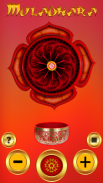




Tibetan Singing Bowls Chakra

Descriere Tibetan Singing Bowls Chakra
The application includes 6 chakras melodies with color therapy visualization that helps you meditate , you receive double chakras stimulation , by hearing and by viewing , this is called chromotherapy.
This chakra opening and balancing program should help you to improve your body and mind energy flow and improve your feeling and thinking process
(*) improved Prana energy flow through the chakra
In this version you get extra bonus of 6 chakra music , two modes meditation for each chakra :
* 6 Tibetan Bowls Therapy Sound.
* 6 Chakra Balancing Therapy Melodies.
Singing bowls (also known as Tibetan Singing Bowls, rin gongs or suzu gongs) are a type of bell, specifically classified as a standing bell. Rather than hanging inverted or attached to a handle, singing bowls sit with the bottom surface resting, and the rim vibrates to produce sound characterized by a fundamental frequency (first harmonic) and usually two audible harmonic overtones (second and third harmonic).
Singing bowls are used worldwide for meditation, music, relaxation, and personal well-being. Singing bowls were historically made throughout Asia, especially Nepal, China and Japan. They are closely related to decorative bells made along the Silk Road from the Near East to Western Asia. Today they are made in Nepal, India, Japan, China and Korea.
The chakras are:
Muladhara – root chakra music & red color therapy.
Swadhisthana – sacral chakra music & orange color therapy.
Manipura – solar plexus chakra music & yellow color therapy.
Anahata – heart chakra music & green color therapy.
Vishuddha – throat chakra music & blue color therapy.
Ajna – third eye chakra music & purple color therapy.
Sahasrara – crown chakra music & violete color therapy.
(*) Indian philosophy describes prana flowing in channels called Nadis. The Shiva Samhita states that there is a total of 350,000 nadis in the human body, while other texts says there are 72,000 nadis, each branching off into another 72,000. These nadis play an important role in the application and understanding of certain yoga practices. Shiva Samhita explains that the three most important nadis are the Ida, the Pingala and the Sushumna, each facilitating the flow of praṇā vāyu throughout the body.
Ida nadi relates to the right side of the brain, and the left side of the body, terminating at the left nostril. Pingala nadi relates to the left side of the brain and the right side of the body, terminating at the right nostril. Sushumna nadi connects the base chakra at the base of the spine to the crown chakra at the top of the head.
The practice of pranayama can be used to balance the flow of prana within the body. When praṇā vāyu enters a period of uplifted, intensified activity, the yogic tradition refers to it as pranotthana, a precursor to the Kundalini state.
























